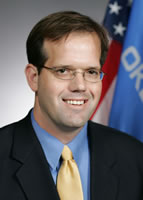In order to provide equal access and equal opportunity to people with diverse abilities, this site has been designed with accessibility in mind. Click here to view
Supreme Court orders oral arguments for Tulsa Dam Case
 Sen. Patrick Anderson
Sen. Patrick Anderson
The Oklahoma Supreme Court has ordered that formal oral arguments be held regarding Sen. Patrick Anderson’s constitutional challenge to the issuance of $25 million in state bond funds for repairs to a dam owned by the City of Tulsa. Arguments will be heard in the Court’s historic Courtroom in the State Capitol on Nov. 8, 2012, at 1:30 p.m.
“I was pleased to learn the full Court has agreed to hear this matter,” said Anderson, R-Enid. “Not all cases that are sent to the Supreme Court are scheduled for oral arguments in this manner. The Court’s action today sends a strong message that this issue is being taken very seriously. Oklahomans should be reassured that the members of the Supreme Court are committed to protecting the rights of the state’s taxpayers.”
The bonds in question were approved by the Legislature in 2009, with the understanding that they would be matched with $50 million in federal dollars to build a series of low-water dams along the Arkansas River. Federal funds were never appropriated and the project never moved forward. In January of this year, an effort was initiated to issue the 2009 bonds for a new purpose, without the Legislature’s approval. Proponents of the bonds now intend to spend the $25 million to raise the level of the existing Zink Dam in Tulsa by a mere three feet, so a city park area can be developed for recreational purposes.
Earlier this year, Anderson filed suit to stop the issuance of the bonds, challenging the constitutionality of the proposal on the grounds that the new use is not what the Legislature originally intended. Anderson said the issuance of the bonds would amount to an unconstitutional gift to the City of Tulsa, and would create debt for the state.
“The Oklahoma Constitution forbids using funds for a purpose other than that intended by the Legislature, it prohibits the state from making gifts and it forbids the creation of debt without a vote of the people,” Anderson said. “I’m confident the Court will find this irresponsible use of tax dollars to be unconstitutional.”
 Oklahoma Senate
Oklahoma Senate

